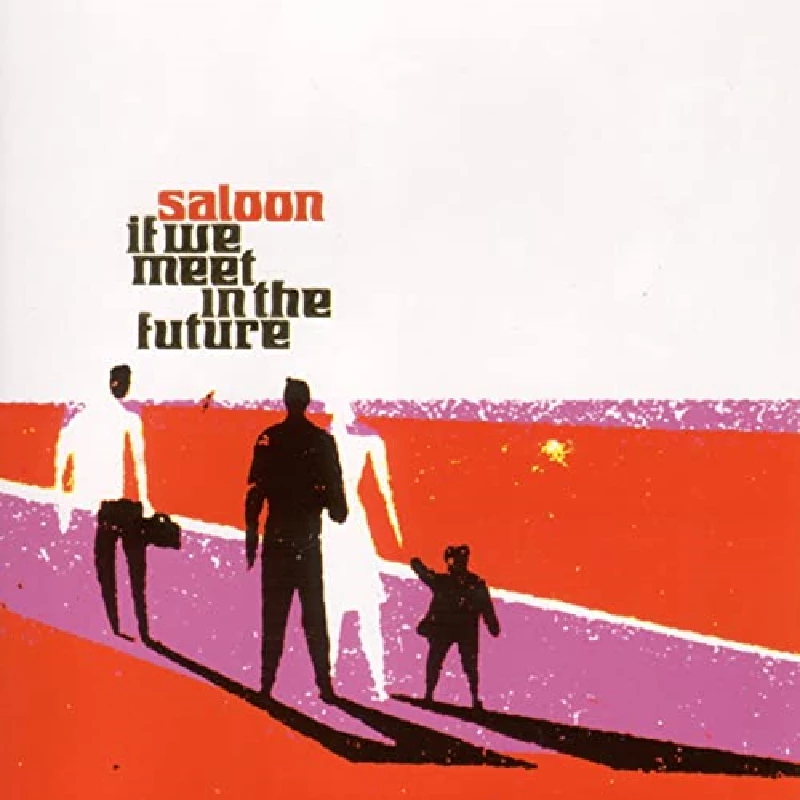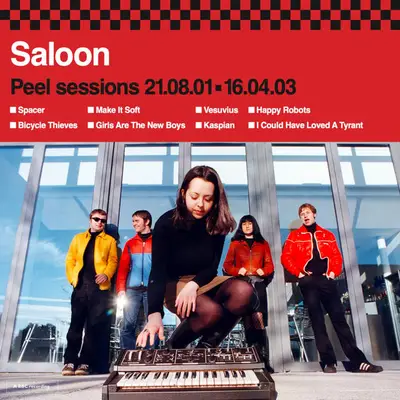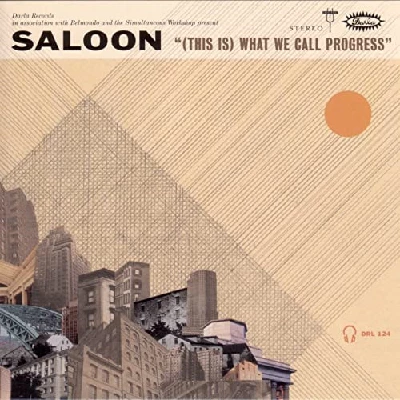Saloon - If We Meet In The Future
by John Clarkson
published: 12 / 7 / 2003

Label:
Track And Field
Format: CD
intro
Disappointing second album from the critically acclaimed Saloon, which, despite several fine point moments, proves to be "a just a little too over reminiscent" of their first album '(This is) What We Call Progress'
Saloon had a fantastic year in 2002. Their single, 'Girls are the New Boys', was voted in at No. 1 in the Radio 1 DJ John Peel's listeners Annual Festive 50 poll, and their much acclaimed debut album, '(This is) What We Call Progress', also did well. The five-piece Reading-based group's hypnotic blend of melancholic folk-rock, Kraut-rock and electronica is certainly unique. In an era in which music only occasionally proves to be challenging without being unlistenable, Saloon's one-off form of catchy intellectual pop has deserved all the praise that has been lavished on it. Yet for all this their second album, 'If We Meet in the Future', is a disappointment. It is a record undoubtedly of some very fine moments. The eerie, faintly sinister 'Vesuvius' kicks the album off to a magnificent start, with its accelerating synthesisers and driven rhythms, a soaring vocal from singer, Amanda Gomez, and a magnetic, strident two-chord guitar line. The twee electro-folk ballad, 'Dreams Mean Nothing', balances a world-worn vocal from Gomez up against mournfully waltzing scrapings of viola from Alison Cotton. In its depiction of a woman left on her own again by her serial philanderer of a boyfriend, it proves to be genuinely moving. The next track, the irony-laden 'The Good Life,' in complete contrast merges huge bubbling slabs of synths with perky pop beats. Its chirpy sound could push even the most lethargic of music fans onto the dance floor. Despite this, however, and for all its diversity, there is a definite sense of deja vu in listening to 'If We Meet in the Future'. Within its own framework 'If We Meet in the Future' is a very strong album, but there is little here that has not appeared already on '(This is) What We Call Progress'. The vibrant synthesisers ; the subtle balancing of acoustica with electronica ; Gomez's ethereal vocals which switch between English, French and Spanish ; Michael Smoughton's rattling drumwork, and the occasional doses of quirky humour, which make up this second record, are all just a little too over reminiscent of that first album. Only 'Dreams Means Nothing' gently points at a possible new direction. There is nothing usually wrong with a band using its first album as a blueprint for its second. In the case of such an intelligent, innovative group as Saloon, however, it comes across as something of an anti-climax. Perhaps a lot of the problem with 'If We Meet in the Future' is in its timing. It took Saloon four years after forming before they released '(This is) What We Call Progress' , but 'If We Meet in the Future' has been hastily recorded and put out in less than a year. The band has spent.a lot of the last twelve months touring and has been working under an increasingly high profile. One can perhaps hardly blame its members for lacking new musical ideas and direction at the moment. One can only hope, however, though that they will allow themselves more time to nurture and develop their undoubted ability and talent before beginning work on their third album.
Track Listing:-
1 Vesuvius2 Absence
3 Que Quieres?
4 Happy Robots
5 Kaspian
6 Dreams Mean Nothing
7 The Good Life
8 Intimacy
9 The Sound of Thinking
10 I Could Have Loved a Tyrant
Band Links:-
https://en.wikipedia.org/wiki/Saloon_(band)
interviews |
|
Interview (2002) |

|
| Saloon's debut album '((This is) What We Call Progress' was released on the Track and Field label in April to critical acclaim. Adam Cresswell and Amanda Gomez from the band talk to Gary Wollen about its production, their influences and playing live |
favourite album |
|
Peel Sessions 21.08.01 • 16.04.03 (2025) |

|
| In our Re:View section, in which we look back on recordings from the past, Dave Goodwin examines two John Peel Sessions from early 2000's indiepop band Saloon which have just been released by the always reliable Precious Recordings of London on 12" vinyl. |
reviews |
|
This Is What We Call Progress (2002) |

|
| Beautiful, sparse and evocative debut album from English group from Reading with Galaxie 500 and Velvets American underground type sound, but whose influences also remain very much British and European |
most viewed articles
current edition
Tossing Seed - InterviewLast of the Lovely Days - Interview
Motorcycle Boy - Interview
Lemonheads - O2 Ritz, Manchester, 16/8/2025
Waterboys - Roundhouse, London, 1/6/2025
Cary Baker - Down on the Corner: Adventures in Busking and Street Music
Belouis Some - Video Vault
Robert Forster - Interview
Brian Wilson - 1942-2025
Morrissey - Photoscapes
most viewed reviews
current edition
Liarbilitys - VandalheartKirk Adams and Ed Woltil - Eat The Sunshine, Drink The Starshine
Silver Biplanes - Coming Up For Air
Big Flame - Peel Sessions 84-86
Suzie Ungerleider - Among The Evergreens
Bruce Dickinson - More Balls to Picasso
Good Charlotte - Motel du Cap
Wolf Alice - The Clearing
Rupert Wates - Father to the Man
Phew, Erika Kobayashi,, Dieter Moebius - Radium Girls
Pennyblackmusic Regular Contributors
Adrian Janes
Amanda J. Window
Andrew Twambley
Anthony Dhanendran
Benjamin Howarth
Cila Warncke
Daniel Cressey
Darren Aston
Dastardly
Dave Goodwin
Denzil Watson
Dominic B. Simpson
Eoghan Lyng
Fiona Hutchings
Harry Sherriff
Helen Tipping
Jamie Rowland
John Clarkson
Julie Cruickshank
Kimberly Bright
Lisa Torem
Maarten Schiethart